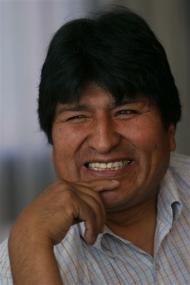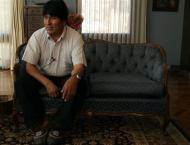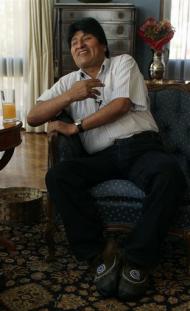Bolivia's Morales Recounts Police Abuse
November 3, 2007, ap.google.com -AP
By DAN KEANE and FRANK BAJAK
LA PAZ, Bolivia (AP) — In a new feature film about his journey from dirt-poor sheep herder to Bolivia's president, Evo Morales is portrayed being beaten unconscious by anti-narcotics police and found the next day by fellow coca union leaders.
In an interview with The Associated Press, Morales said there were in fact multiple beatings during his years fighting forced coca eradication — and that he wants the armed U.S. agents who still direct his country's anti-narcotics police to leave Bolivia.
"It wasn't just once or twice," Morales said Friday, becoming animated as he recounted harrowing memories from the comfort a sofa in his presidential residence. "I could tell you many of these stories."
Bolivia's first indigenous president also told the AP that the world's richest nations must be made to pay for the damage their profligate use of natural resources has caused developing countries.
He said he and other Latin American leaders are exploring possible legal means for demanding compensation for the developed world's "ecological debt."
"It's not possible that some in the industrialized world live very well economically while affecting, even destroying others," said the 48-year-old Aymara Indian. Scientists count this Andean nation's rapidly melting glaciers among the most profound signs of global warming.
In a wide-ranging 70-minute interview, Morales also said:
• His version of socialism requires state control of all basic services, including telecommunications.
• Armed separatists are looking to provoke fatal confrontations in the country's pro-autonomy eastern lowlands. He said he ordered troops to quit the region's main airport last month during a standoff over landing revenues after getting intelligence that the crowd that had stormed the facility included rabble-rousers with guns.
• This majority indigenous country will next week become the first to ratify the Sept. 13 U.N. declaration endorsing the rights of the world's native peoples. The United States, Canada, Australia and New Zealand were the only countries to vote against the declaration.
After winning the presidency in December 2005, Morales has increased Bolivia's annual natural gas revenues from $300 million to $2 billion a year by exerting greater state control over the industry.
Water utilities have reverted to state control and authorities are negotiating the re-nationalization of the country's main telecommunications company, Entel, which is owned by Telecom Italia SpA. Officials have indicated electrical power could be next.
Morales has allied himself closely with Hugo Chavez, Venezuela's leftist president, and Fidel Castro, Cuba's aging leader.
But his vision of socialism is guided, Morales said, by the communal decision-making of Bolivia's indigenous societies and their "way of living in harmony with Mother Earth."
Those politics have not endeared him to the United States, his nemesis in the late 1980s and 1990s when he led coca growers, or "cocaleros", in protests against Washington-directed forced eradication campaigns. The plant's small green leaf has been chewed as a mild stimulant here for millenia, but is best known outside the country as the base ingredient of cocaine.
The struggle between protesters and eradication forces often became a deadly game of cat and mouse.

Bolivia's President Evo Morales gestures in an interview with The Associated Press at the presidential palace in La Paz, Friday, Nov. 2, 2007 where he said that the world's richest nations must be made to pay for the damage their profligate use of natural resources has caused in Bolivia and other developing countries.(AP Photo/Juan Karita)


One night in 1989, police nabbed Morales at a coca farmers' dinner, dragging him away to a van where he was kicked repeatedly. A crowd of his fellow cocaleros gave chase, prompting worried police "to start kicking me even harder," Morales remembered.
"But then suddenly they lifted me high up, and I'm up there with my face towards the floor of the van, and they threw me down like a piece of meat," he said. "I passed out."
Cocaleros rushed van and the police fled into the jungle, where they dumped their unconscious prisoner.
Friends of Morales found him prone and bleeding the next day, a scene recreated in the Bolivian-made film "Evo Pueblo."
While last month he expressed his desire that all U.S. military personnel leave Bolivia, Morales on Friday said he wants any and all armed foreign troops out.
Despite his close ties with Chavez, the only Venezuelan soldiers now in Bolivia are unarmed pilots who fly him around in loaned helicopters, Morales said.
"The only armed soldiers I've seen are those from the United States."The U.S. Embassy will not say how many troops or military contractors it has in the country, but they are believed to not exceed a few dozen.
Many of them work out of the base at Chimore, in the coca-growing foothills of central Bolivia. Morales once spent many a long night in the base's jail cells.
"In those days, when I was at Chimore, I was detained, I was handcuffed, I was locked up," he remembered. The president smiled and shook his head.
"Now they have to salute us every time we arrive."